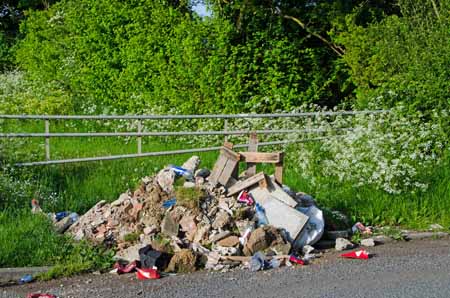Fly-tipping statistics published by Defra this week highlight that it is a “low-risk and high reward crime”, according to the Environmental Services Association (ESA).
And, Keep Britain Tidy has called on the government to make “tackling the scourge of fly-tipping” an urgent priority by bringing in immediate reform of the waste carrier licensing system and use of income from the landfill tax.
Based on incidents and actions reported through WasteDataFlow, the data showed 976,000 fly-tipping incidents were recorded in 2019/20, up 2% from 957,000 in 2018/19 (see letsrecycle.com story).
Penalties
Head of regulation at the ESA, Sam Corp, said: “Regulating against this behaviour and prosecuting offenders is challenging and, coupled with relatively low penalties even when an offender is convicted, these factors unfortunately make fly-tipping a low-risk and high-reward crime.
“The ESA recognises that Defra has been working to reform the system, to include more rigorous front end checks, competency requirement and mandatory electronic waste tracking, but we are keen to see quicker progress and more resources allocated to the Environment Agency in particular”.
Enforcement
The data also showed that in terms of enforcement, local authorities carried out 474,000 enforcement actions in 2019/20, a decrease of 26,000 actions (5%) from 501,000 in 2018/19.
The number of fixed penalty notices issued was 75,400 in 2019/20, a decrease of 2% from 77,000 in 2018/19.
Meanwhile, the number of court fines issued increased from 2,056 to 2,671 in 2019/20, with the value of total fines increasing to £1,170,000, an increase of 7% on the £1,090,000 total value of fines in 2018/19.
Fines
Cllr David Renard, environment spokesperson for the Local Government Association, pointed to the number of fines increasing as a success.
“Fly-tipping is inexcusable. It is not only an eyesore for residents, but a serious public health risk, creating pollution and attracting rats and other vermin. It also costs local taxpayers almost £50 million a year to clear up,” he said.
Cllr Renard added: “It is good to see a rise in the number of fines issued to the worst offenders in 2019/20. We continue to urge the Government to review sentencing guidelines for fly-tipping, so that offenders are given bigger fines for more serious offences to act as a deterrent.
“Manufacturers should also contribute to the costs to councils of clear up, by providing more take-back services so people can hand in old furniture and mattresses when they buy new ones.”
Man and van
The data also outlined the types of incidents reported, with more than a third of all incidents relating to small-van size tips.
In 2019/20, 33,000 or 3% of total incidents were of ‘tipper lorry load’ size or larger, which is a decrease of 8% from 36,000 in 2018/19.
The issue of ‘man and van collections’ was raised by Allison Ogden-Newton OBE, chief executive of Keep Britain Tidy, who said: “The fact that more than a third of all fly-tips (34%) are small-van size shows that this environmental crime is being driven by ‘man with a van’ operators who are conning the public with what appears to be a cheap way of getting rid of their rubbish, but one that leads to illegal disposal and environmental devastation.”
Data
The Defra statistics were slightly revised in 2018/19 after Defra said it was aware of a few local authorities who were not reporting all incidents or who had changed their basis of reporting.
To improve transparency in the reported data, Defra says it added an additional question to WasteDataFlow to cover all incidents. This includes customer/public reported and those reported by and pro-actively cleared by contractor crews.
‘Improved’
Carole Taylor, chair of LARAC, said: “The move to reporting fly tipping incidents through Waste Data Flow is one that has improved the data on fly tips. There is still more work to be done to gain even greater consistency. The figures show a slight increase in reported incidents although we know councils have increased ways in which fly tipping can be reported, such as clean and green apps.
“This allows councils to deal with fly tipping quicker and more effectively. There is a worry about the reduction in enforcement and this shows how stretched councils were even before the impact of Covid 19 had on their operations. More needs to be done to support local authorities in their enforcement of fly tips and reduce the burden this has on the public purse. Councils do a sterling job in dealing with fly tips but better support would help improve this even more.”
The post Fly-tipping is ‘low risk and high reward’, says ESA appeared first on letsrecycle.com.
Source: letsrecycle.com Waste Managment







